“He Spake Many Things unto Them in Parables”
Matthew 13
LDS manual: here
Purpose
To show that the church encourages lying by omission, and to encourage readers to be more honest in their personal lives
Reading
This week’s reading is one of the shortest — just one chapter long. It’s all about parables. Parables are stories where things stand for other things, and they lend themselves to more than one interpretation. That means they can mean anything you want them to mean. So it’s perfect for religion.
Main ideas for this lesson
The reason for parables
Let’s start off with a quiz.
Ask: Why did Jesus speak in parables?
- To make divine principles clearer by using common everyday objects people would have known about
- To keep his teaching at the front of hearers’ minds by using things they would have had daily interaction with
- To purposely confuse people so that they wouldn’t understand him, and they wouldn’t be saved.
The surprising answer:
Mark 4:11-12: And he said unto them, Unto you it is given to know the mystery of the kingdom of God: but unto them that are without, all these things are done in parables: That seeing they may see, and not perceive; and hearing they may hear, and not understand; lest at any time they should be converted, and their sins should be forgiven them.
Isn’t this odd? Presumably God wants as many people as possible to be saved, but that doesn’t appear to be the case here. Instead, Jesus is setting up an in-group and an out-group, with different levels of knowledge for those who are in and who are out. (It’s why I say that Jesus was the first modern cult leader.) Seen this way, Christianity begins to look like some exclusive club for those who have already made up their minds to believe. And what do you know: it is! Who else would believe on such poor evidence except those who, for social or aspirational reasons, have already given themselves and their thinking over to the narrative?
But this is a terrible way for a god to run things. Jehovah / Jesus is hiding the (allegedly) saving truths of the gospel from people, and they will (one presumes) be languishing in hell / isolation / separation from god for eternity. Why would he hide the truth from them?
When salvation is on the line, God should speak clearly, not in riddles and double meanings.
Is Mormonism ‘occult’?
One of the insults people sometimes hurl at the LDS Church is that it’s occult. They usually meant satanic, evil, and so forth.
I don’t think the Mormon Church qualifies as occult in the sense that people mean it today. However, there’s an older sense of occult, which is a bit more like hidden:
Oxford: Communicated only to the initiated; esoteric.
In this earlier meaning of occult, the LDS Church definitely qualifies. For investigators, there’s a gradual rolling-out of doctrine, with multiple levels; one for people who have been “initiated into the mysteries”, and another for those who haven’t. Temple worship is occult in that you’re only allowed to have teh sercet nollij once you’ve been initiated into the mysteries. “Milk before meat”, as they say.
Think about how this plays out in the modern church. I’m not a believer, but I’m an easy guy to convince; all you have to do is lay out the facts, and I’ll change my mind. Yet in my interactions with believers and missionaries, I’ve heard many of the following things:
- I could sit here and explain everything to you, but because you don’t believe, it won’t do any good.
- There are experiences that are too sacred to talk about (except with people who believe).
- I’m not going to show you a sign through your disbelief.
- You have to believe first, and then the truth will be obvious.
- Faith precedes the miracle.
This is all part of the same idea: only share certain information with people who believe, and withhold information from those who don’t. And if you think this secretive jazz is weird or unique to Mormonism, remember: it was encouraged by Jesus himself.
Read Steve Hassan’s BITE model of cult mind control. (As far as I’m aware, this model is not well-accepted by psychologists, but many of the items ring a few bells for me.)
Ask: How have you noticed that the LDS Church uses information control, as below?
Information Control
1. Deception:
a. Deliberately withhold information
b. Distort information to make it more acceptable
c. Systematically lie to the cult member
…
3. Compartmentalize information into Outsider vs. Insider doctrines
a. Ensure that information is not freely accessible
b. Control information at different levels and missions within group
c. Allow only leadership to decide who needs to know what and when
For ex-Mos and psychologists, it’s easy to see why the church would roll out the weird stuff slowly: people would freak out and bolt if they were confronted with it all at once. Shoot, I might have bolted at my own endowment myself, were it not for a lifetime of religious training, and everyone in my family right there, dressed in weird robes, in my first endowment session.
The hope is that by the time the member is introduced into the mysteries, they will have invested so much that leaving is unlikely.
I think the Mormon practice of concealing information — and even “lying for the Lord” — is harmful to its members. It gives members a licence for dishonesty. It’s acceptable to hide or shade unpalatable facts. After all, you know it’s true, so whatever you do in the service of the truth is okay.
Watch this video of Gordon Hinckley on the Larry King Show. How many false statements does he make about polygamy?
Quoted in Time Magazine, Aug 4, 1997: “On whether his church still holds that God the Father was once a man, [Hinckley] sounded uncertain, `I don’t know that we teach it. I don’t know that we emphasize it… I understand the philosophical background behind it, but I don’t know a lot about it, and I don’t think others know a lot about it.'”
Hinckley claimed he was misquoted:
“I personally have been much quoted, and in a few instances misquoted and misunderstood. I think that’s to be expected. None of you need worry because you read something that was incompletely reported. You need not worry that I do not understand some matters of doctrine. I think I understand them thoroughly, and it is unfortunate that the reporting may not make this clear. I hope you will never look to the public press as the authority on the doctrines of the Church. (1997 October General Conference)”
This attitude shows up for other church leaders:
Boyd K. Packer“There is a temptation for the writer or the teacher of Church history to want to tell everything, whether it is worthy or faith promoting or not.
“Some things that are true are not very useful.
…
“The scriptures teach emphatically that we must give milk before meat. The Lord made it very clear that some things are to be taught selectively, and some things are to be given only to those who are worthy.
“It matters very much not only what we are told but when we are told it. Be careful that you build faith rather than destroy it.”
And in the rest of my life, I followed this pattern of hiding or shading things about myself or my behaviour — presenting them in the best possible light and omitting uncomfortable details — because I was afraid I wouldn’t be accepted as I was. And why wouldn’t I have? It was acceptable in the service of the church. This tendency was very damaging, and did not serve me well. Again, maybe I’m alone on this, but I really do feel like I got mixed messages about honesty in church. On the one hand, it teaches honesty. On the other, it only reveals the good parts of the church’s history, teachings, and practices. Anything uncomplimentary is written off as anti-Mormon lies.
It’s taken me a lot of effort to become a more honest person; to say it (and see it) like it is. What did it for me was science. Let me explain.
When I was a church member, I thought the church was the standard for what it meant for something to be true. That meant that I could make up explanations and complicated apologetics in defence of church doctrine, and as long as it sounded plausible, I could defend it as ‘probably true’.
But when I used science, the standard was the real world. If I wanted to come up with a hypothesis for why something was so, it had to be grounded in real observations, not wishful stories. And that meant I couldn’t just see things the way I wanted. If I tried that, I knew someone would come around with the facts, and smack me down. Nobody wants another scientist to come around and eat their lunch, so this is a great incentiviser. I had to make sure I was getting it right and not deceiving myself. It’s been a great lesson, and one that has served me well in work and in life. Ironically, I had to leave the church before I could learn it.
Additional lesson ideas
Without honour… in his own country
People didn’t seem to buy the whole Jesus thing in his own country.
Matthew 13:54 And when he was come into his own country, he taught them in their synagogue, insomuch that they were astonished, and said, Whence hath this man this wisdom, and these mighty works?
13:55 Is not this the carpenter’s son? is not his mother called Mary? and his brethren, James, and Joses, and Simon, and Judas?
13:56 And his sisters, are they not all with us? Whence then hath this man all these things?
13:57 And they were offended in him. But Jesus said unto them, A prophet is not without honour, save in his own country, and in his own house.
Ask: Why didn’t people believe Jesus in his hometown?
Answer: People know you in your hometown. It’s harder to fool people who know you.
Wheat and tares
Why does God allow all the terrible non-Christians to exist? Jesus explains:
Matthew 13:24 Another parable put he forth unto them, saying, The kingdom of heaven is likened unto a man which sowed good seed in his field:
13:25 But while men slept, his enemy came and sowed tares among the wheat, and went his way.
13:26 But when the blade was sprung up, and brought forth fruit, then appeared the tares also.
13:27 So the servants of the householder came and said unto him, Sir, didst not thou sow good seed in thy field? from whence then hath it tares?
13:28 He said unto them, An enemy hath done this. The servants said unto him, Wilt thou then that we go and gather them up?
13:29 But he said, Nay; lest while ye gather up the tares, ye root up also the wheat with them.
13:30 Let both grow together until the harvest: and in the time of harvest I will say to the reapers, Gather ye together first the tares, and bind them in bundles to burn them: but gather the wheat into my barn.
If the tares are the bad people, and the wheat is the good people, I guess this explains why God is leaving everyone alone, in a good impersonation of someone who doesn’t exist. On the other hand, does this mean God is going to burn people? If so, this would be right in line with Jesus’ other teachings on hell. But more about those later.
Okay, I admit I could be misunderstanding this parable, but that’s probably Jesus hiding the truth from me because I haven’t chosen to accept all this Christian bullshit uncritically, right? So score one for Jesus. Well done.
Faith as a mustard seed
Jesus tells the parable of the mustard seed.
Matthew 13:31 Another parable put he forth unto them, saying, The kingdom of heaven is like to a grain of mustard seed, which a man took, and sowed in his field:
13:32 Which indeed is the least of all seeds: but when it is grown, it is the greatest among herbs, and becometh a tree, so that the birds of the air come and lodge in the branches thereof.
There may be some dodgy science here. Mustard seeds aren’t the smallest, and it’s not clear that mustard trees are big enough for birds to sit in.
But let’s take it parabolically.
Last year, a good friend of mine converted to Christianity. When we were housemates, she always seemed like a secular agnostic, but then she moved away, started hanging out with Christians, and now here she was on social media babbling away about how wonderful God and Jesus were. In particular, she cited this scripture, and said that her faith, even as small as a mustard seed, finally grew.
There’s always a self-blaming moment for me when that happens, though it hasn’t happened often. For a moment, I did think, “What could I have done? Could I have been there for her?” but I shook it off. I can’t be everywhere for everyone, and I’m being as public and available as I can with this blog and everything else. Some people will just be susceptible to the beliefs of whoever they’re near, and some people will just believe things for bad reasons. And trying to keep your fingers in someone else’s brain so they won’t believe bad things — that’s for Christians, not me.
But I take the mustard seed parable the opposite way: Even a small germ of belief can grow and metastasise. It speaks to the importance of being rational, knowing how to spot bad arguments, and demanding evidence for claims. Even just a tiny lapse in critical thinking can have severe consequences and lead to bad decisions.
Bad decisions like this book cover.
Admit it, you saw ass.
Egad. That’s the worst haemorrhoid I’ve ever seen. Looks like it’s totes thrombosed. It’s almost blue.
But wait: there’s more. Here’s the original image.
LOL non-proportional scaling.
I tried to find that first image by searching ‘mustard butt fingers’, and then wished I hadn’t. I think that means it’s time to put down the computer. See you next week.


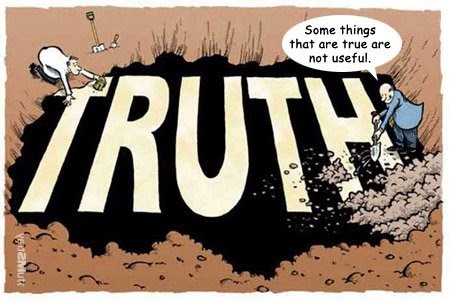
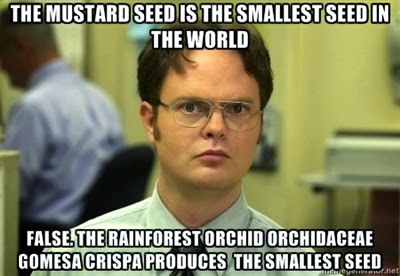
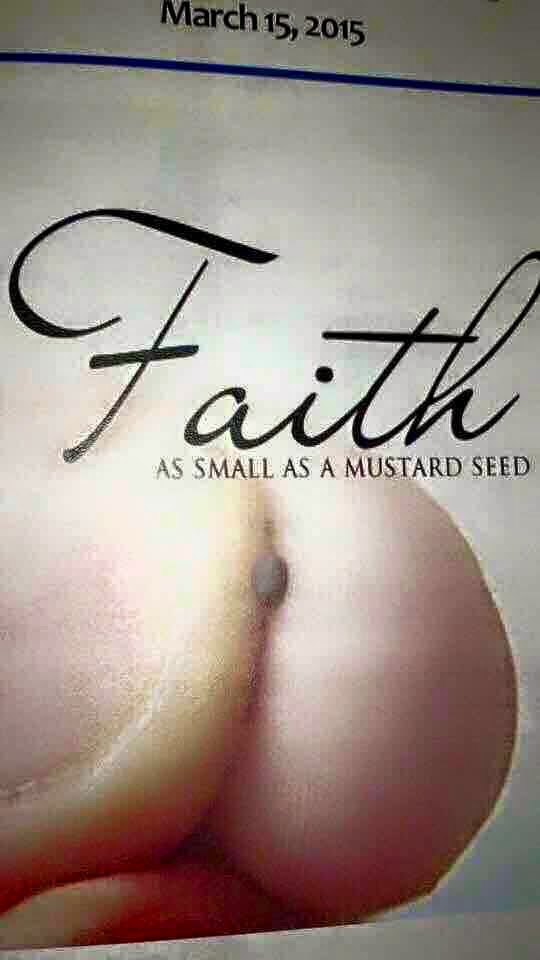

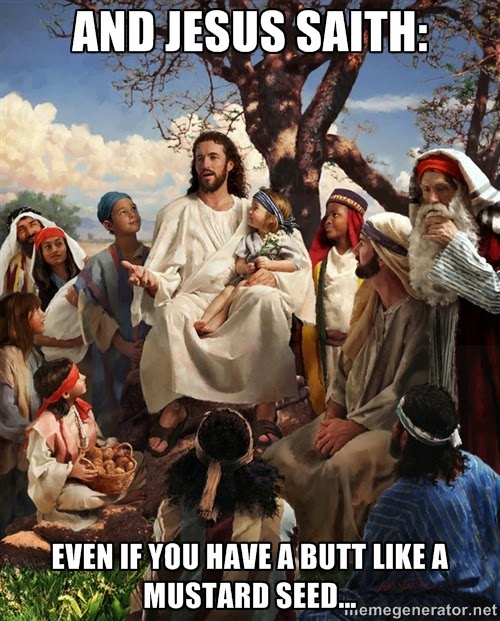


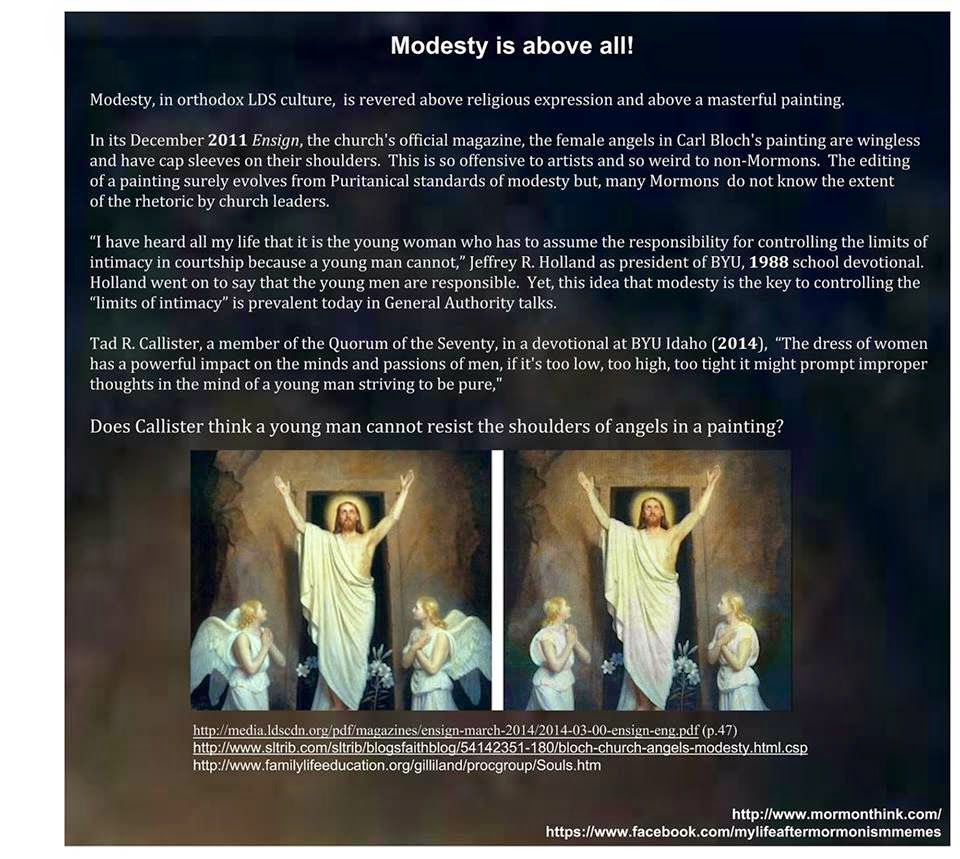

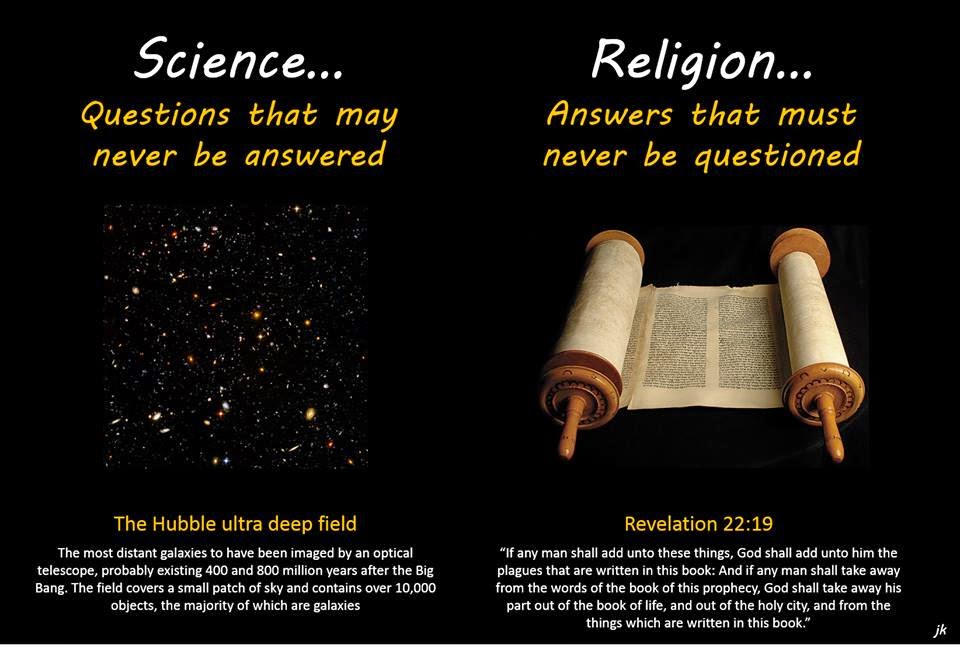





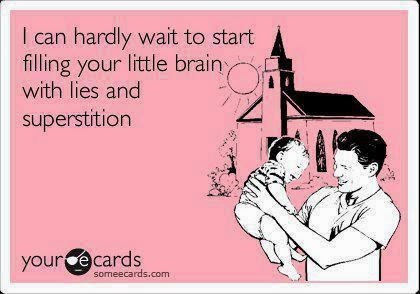
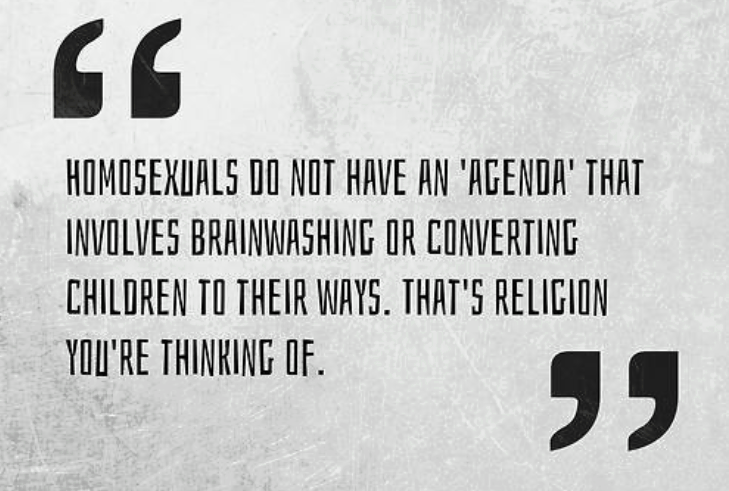




Recent Comments